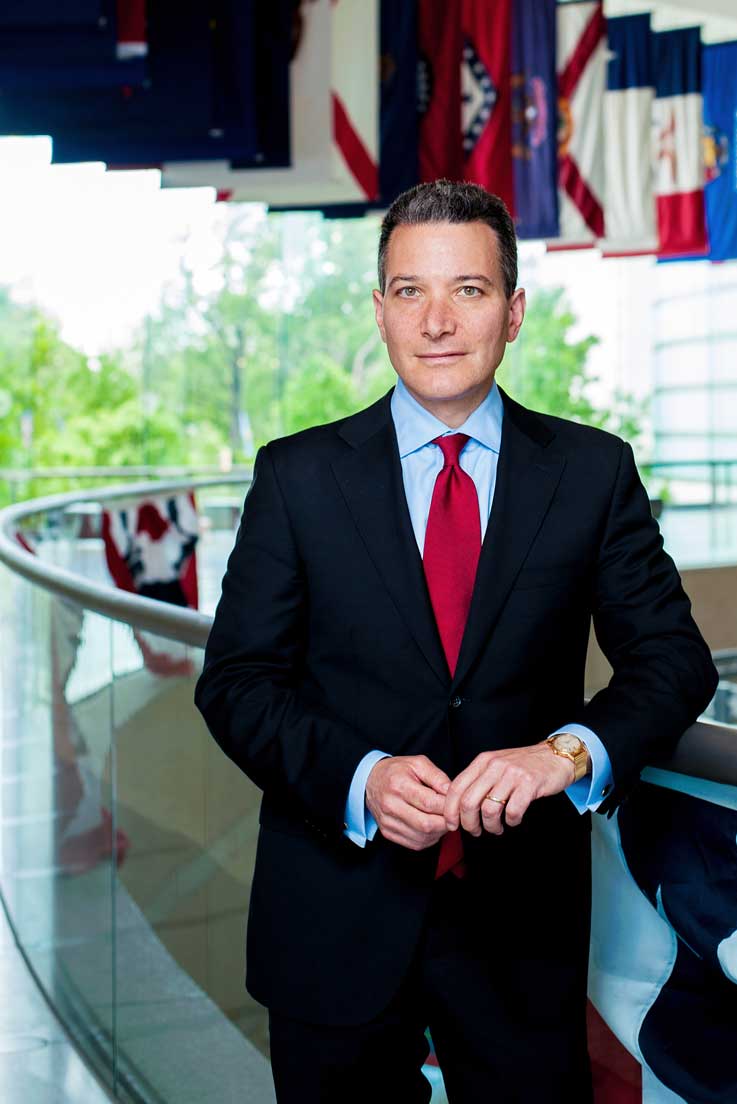Jeffrey Rosen, professor of law at the George Washington University Law School and president and CEO of the National Constitution Center, will discuss “Free Speech, the Constitution, and the Public University” at Indiana University of Pennsylvania on April 17.
 His presentation, free and open to the community, will take place at 7:00 p.m. in room 225 of the Humanities and Social Sciences building. His appearance is sponsored by the IUP Free Speech Project.
His presentation, free and open to the community, will take place at 7:00 p.m. in room 225 of the Humanities and Social Sciences building. His appearance is sponsored by the IUP Free Speech Project.
Rosen, a contributing editor of the Atlantic, is a graduate of Harvard College, Oxford University, and Yale Law School.
His latest book, for the American Presidents Series, is William Howard Taft. His other books include: Louis D. Brandeis: American Prophet; The Supreme Court: The Personalities and Rivalries that Defined America, the best-selling companion book to the award-winning PBS series; The Most Democratic Branch: How the Courts Serve America; The Naked Crowd: Freedom and Security in an Anxious Age; and The Unwanted Gaze: The Destruction of Privacy in America. Rosen is coeditor, with Benjamin Wittes, of Constitution 3.0: Freedom and Technological Change.
His essays and commentaries have appeared in the Atlantic, the New York Times Magazine, on National Public Radio, in the New Republic, where he was the legal affairs editor, and in the New Yorker, where he has been a staff writer. He hosts the weekly We the People podcast.
The Chicago Tribune named him one of the 10 best magazine journalists in America, and the Los Angeles Times called him the nation's most widely read and influential legal commentator.
The National Constitution Center, located on Independence Mall in Philadelphia, is the only institution in America chartered by Congress to “disseminate information about the United States Constitution on a nonpartisan basis.”
It is a private, nonpartisan nonprofit, with three goals for fulfilling a mission to increase awareness and understanding of the US Constitution: to serve as the Museum of We the People, America's Town Hall, and a Headquarters for Civic Education. The Center's three goals are summarized in three words: Visit. Learn. Debate.
The Center is designed to “bring the Constitution vividly to life and to inspire active citizenship through engaging exhibits, dynamic discussions, and cutting-edge educational resources for people of all ages.” It is also a unique convening space, dedicated to presenting all sides of historic and contemporary constitutional questions by uniting exceptional leaders, writers, and thinkers from across the ideological spectrum.
The Constitution Center's website offers information about exhibits, videos, and podcasts from the Town Hall programs and debates, and civic education resources for students and citizens of all ages, including an “Interactive Constitution.”
IUP launched its Year of Free Speech in September. Programming since the opening session, “Words: Use Responsibly,” have included a public reading of the Constitution and a conversation with the founding fathers; a program on censorship and comic books; a discussion with a representative of the Pennsylvania American Civil Liberties Union on “Why Defend the Speech We Hate;” and a program with Greg Lukianoff, author of The Coddling of the American Mind: How Good Intentions and Bad Intentions Are Setting Up a Generation for Failure.
The next event is a roundtable discussion, coordinated by a member of a political science class focusing on free speech and the Constitution, led by Gwen Torges. The program is designed to discuss the question: “Can They Really Say That? Surviving Free Speech on a College Campus.” It will be held April 24 at 6:00 p.m. in the Humanities and Social Sciences building, room 126. In addition to the students, the program will include IUP President Michael Driscoll and Chief Diversity and Inclusion Officer and Title IX Coordinator Elise Glenn, director of the IUP Office of Social Equity.
More information about the Free Speech project is available on Twitter @IUPwordsmatter or on Instagram @IUPFreeSpeech.